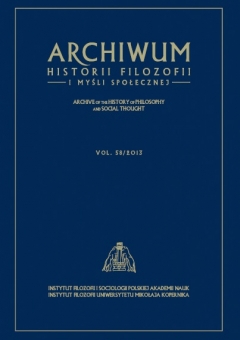Relacja jednostka-państwo w wybranych nowożytnych teoriach własności
The Relationship between the Individual and the State in Selected Modern Theories of Property
Author(s): Wojciech WłochSubject(s): Political Philosophy, Philosophy of Law
Published by: Instytut Filozofii i Socjologii Polskiej Akademii Nauk
Keywords: Hobbes; Locke; Rousseau; Kant; property; liberalism; absolutism;
Summary/Abstract: The aim of the article is to show through an analysis of selected modern theories of property how the philosophical (natural-law) justification of property influences an individual’s legal and constitutional position according to a particular doctrine. The objects of the aforementioned analysis are theories by Hobbes, Locke, Rousseau and Kant, whereas the result is an isolation of two types of absolutist theories and two types of liberal theories. Absolutist theories strictly connect the institution of property with the state, they are differentiated mainly by the goal served by the state and the law (peace in Hobbes’s theory, “common interest” in Rousseau’s), as well as the authority (a sovereign or general will). The concept of power is similar in both theories: the authority is not limited by the rights of individuals. Liberal theories articulate the opinion on the priority of the right to property in relation to the institutions of the state and law (their fundamental role is to guarantee rights). Locke’s liberalism is “flexible”, i.e. it does not determine a priori principles regarding the conventional forms of obtaining property, whereas Kant’s liberalism may be defined as “rigid”, since it formulates certain a priori principles of legitimate acquisition of property. Both the empirical liberalism of Locke and the normative liberalism of Kant express the concept of limited authority together with the postulate of primacy of subjective rights.
Journal: Archiwum Historii Filozofii i Myśli Społecznej
- Issue Year: 58/2013
- Issue No: 58
- Page Range: 97-113
- Page Count: 17
- Language: Polish

